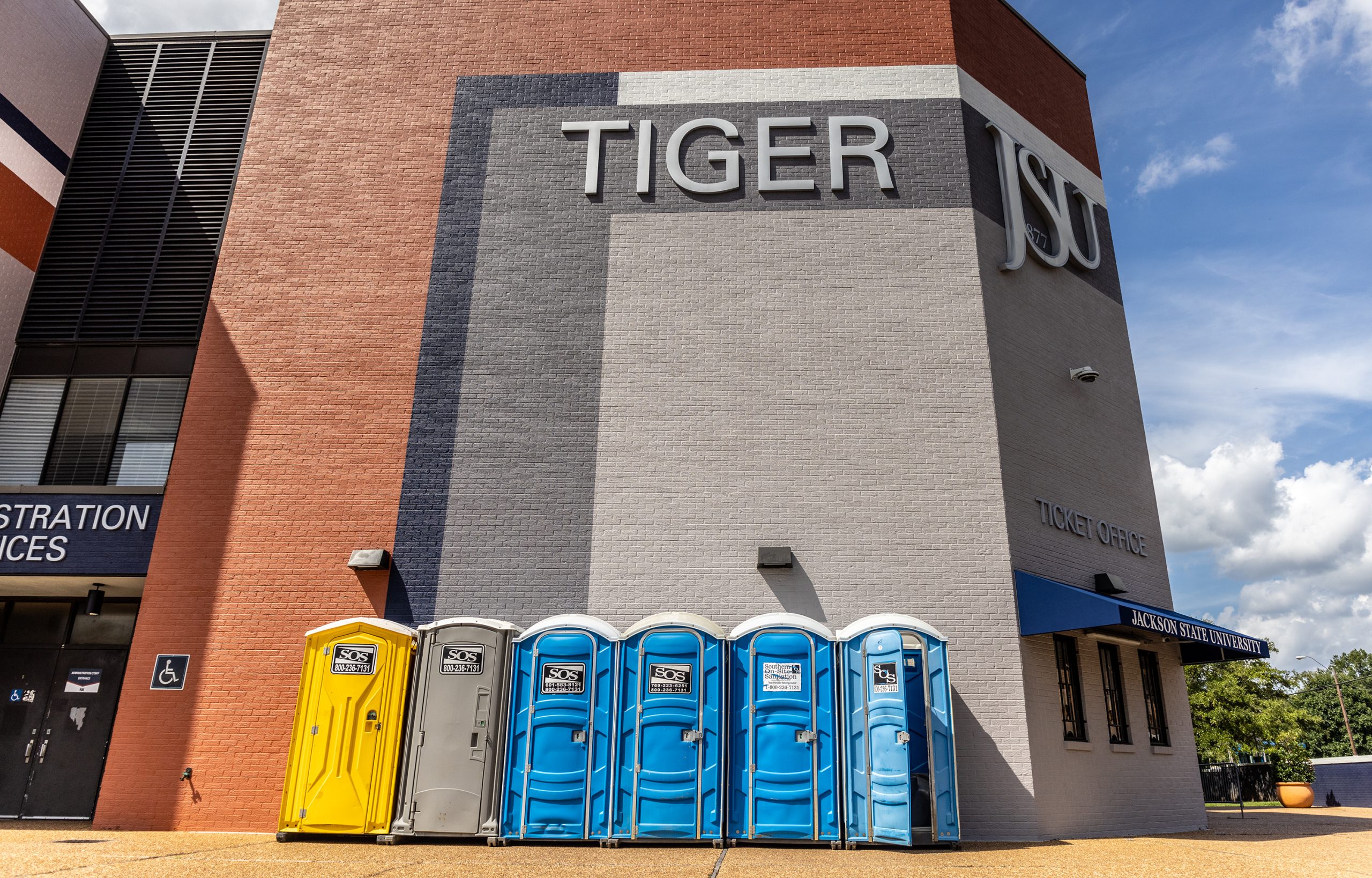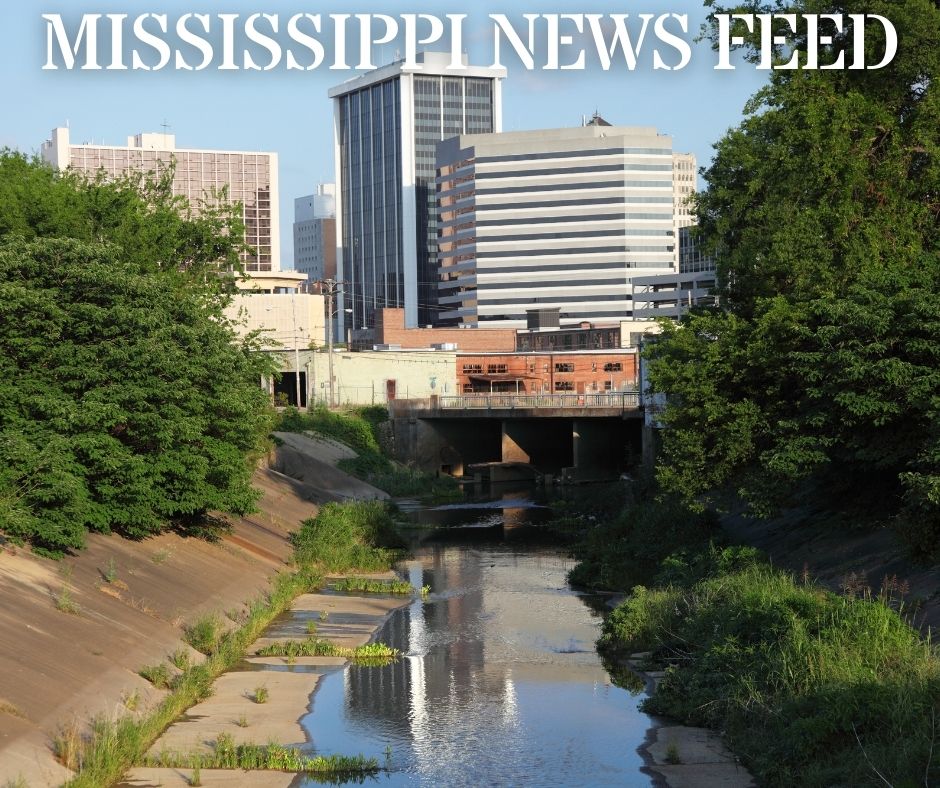Mississippi Today
JSU students pleading for fixes to campus water system as officials quietly seek funding

JSU students pleading for fixes to campus water system as officials quietly seek funding
While Jackson State University officials are quietly working to pull funding for an improved campus water system, students continue to complain of inadequacies.
The historically Black university, situated in the oldest neighborhood in the capital city, has struggled with unreliable water for years — even when there's not an acute crisis.
Students who live in on-campus dorms are particularly struggling. The aging cast iron and lead lines under the university routinely burst, which can make the water smell foul or turn brown. In the winter, freezing temperatures have left students without heat, because the system relies on running water. They've had to buy bottled water, use portable showers and live in hotels.
These conditions make it more difficult for students to focus on the reason they're at Jackson State — to learn. And, the problems could hurt the university's bottom line: Enrollment.
Former President Thomas Hudson — before he was placed on administrative leave —had pledged to get clean, safe water at Jackson State. One of his priorities this session was a $17 million request for state funding for campus infrastructure, including the water system. That goal, Hudson had indicated, has the support of the governor and lieutenant governor. Several lawmakers have introduced bills to get the university funding for projects related to its water system.
Before Hudson was placed on leave, the university had declined to comment on its efforts. His temporary replacement, Elayne Hayes-Anthony, has said she will continue to support the university's legislative priorities. Concrete details from the lawmakers have been hard to come by.
Now, some students say they want to know what exactly the university's administration has been doing to fix the problems on campus.

“Not knowing only adds suspicion to where it's actually going,” Amaya Baker, a junior, said of the university's quest for funds.
Baker says it seems like the problems are never-ending in her dorm. Hot water has returned to showers, however, some residents' washing machines are broken.
There is one plus side: Baker started at Jackson State in the fall of 2020, while pandemic restrictions were in place. Now, she can at least spend more time with friends.
Jackson State is a public institution supported by the state of Mississippi. Tatyana Ross, a senior, said the university shouldn't have to beg for state funding.
At the end of the day, administrators can request more money, but that doesn't mean lawmakers will approve it, Ross said.
“It's not new: Jackson State started off as a school for Negro teachers,” Ross said. “It feels like the state government continues to attempt and disrupt the education of Black people. I believe that it all shows how oppressed African Americans remain in today's time.”
Hudson said in a February interview that his administration is working to get funds for the university to build its own campus water supply, new water lines and a “redundant water supply” in case the city's supply fails again.
The university has declined to discuss the administration's efforts to get a new water supply.
Alonda Thomas, the university's communications director, wrote in a February email that JSU did not want to discuss its legislative efforts to get a new water system.
“We're going to pass at this time,” she wrote. “We'll wait until the session closes and if the study is approved, we'll discuss the findings once the study is conducted.”
An opaque funding process
At a town hall last year, Hudson told students the first step to securing funding for a new water system on campus is to get money for a study. It's a process similar to the one Jackson State undertook to get funding for a stadium feasibility study. A feasibility study looks at a range of factors to determine how possible a construction project is.
The university is already pursuing water-related projects using about $2 million in federal pandemic relief funds that flowed through the Department of Finance and Administration. A spokesperson for the department said the details of those projects aren't yet finalized.
In a statement, Michael Bolden told Mississippi Today and Open Campus that the funds from DFA will provide an “intermediate solution” for the water issues on campus and “a more comprehensive plan for the entire campus.”
“The initial funds provided will inform the details of a more comprehensive emergency water delivery system during times of low to no water pressure events,” the executive director of campus operations said.
So far this session, four measures seeking funding for Jackson State infrastructure improvements —House Bill 189, House Bill 1353, House Bill 1389 and Senate Bill 2969 — have died in committee.
But, this is typical. In the Mississippi Legislature, stalled proposals seeking appropriations or bond funding are often revived in one large bill toward the end of session.
Sen. Derrick Simmons, D-Greenville, said of his bill (SB 2969) that “it was important to file so it could be of record, but if the bill dies … it's not like all is lost.”
Simmons' appropriations bill asked for $8 million “for the purpose of defraying the expenses of repair, renovation and/or upgrades to the university's water system and related infrastructure.” He said an university official from external affairs said that's how much the university would need, but he couldn't say if it would go toward a study or to actual infrastructure improvements.
Simmons said he proposed the bill because he'd heard concerns that the city's water crisis has led to declining enrollment at JSU.
Students echoed that concern. Alora Arnold, a senior, said she regrets the decision to attend JSU because of the ongoing water issues.
Her full scholarship is what has kept her in Jackson.
“Had that not been the case, I would definitely transfer,” Arnold said.
Rep. Angela Cockerham, I-Magnolia, filed two similar bills that also requested $8 million in appropriations. She did not return multiple calls and texts from Mississippi Today.
Four Mississippi universities have their own water systems, according to the Institutions of Higher Learning, including Alcorn State University, Mississippi Valley State University, Mississippi State University, and the University of Mississippi.
The University of Mississippi Medical Center uses its own water source for about 90% of campus with the remaining coming from the city, according to the Institutions of Higher Learning.
Matthew Adams, a junior, says the water issues on campus have left him feeling alone and dampened his social life.
“When you're not able to shower because we're without water or the showers aren't getting warm, you don't feel clean and you stink. I truly feel isolated. My dorm only has one working washing machine, so it's hard to even get clean clothes.”
Rep. John Hines, D-Greenville, was the third lawmaker to file a bill that would have gotten Jackson State money for infrastructure improvements. He noted one reason for the water troubles at Jackson State is that lawmakers have historically underfunded Mississippi's HBCUs compared to the predominantly white institutions.
“I doubt if it passes simply because they really don't want to admit that they had made the failures in providing funding for these institutions,” he said earlier in the session before the bill died.
In the meantime, Jackson State is also turning to private funding.
Bolden said the university has a pot of money — called the Jackson State University Gap Emergency Fund —that can supplement on-campus resources meant to help students navigate the problems. Other services he discussed include on-site counseling and the campus's food pantry that offers bottled water, canned goods and personal hygiene products.

Jaiden Smith, a sophomore, returned home to St. Louis temporarily from Sept.1 to 3 last year during the water crisis. At that point in the crisis, students had gone days without laundry service and water on the upper floors. The university had to set up portable showers.
“I didn't want to go to class or do fun events on campus because I couldn't enjoy the basic necessities of a nice shower,” she said.
Molly Minta covers higher education for Mississippi Today, in partnership with Open Campus. Alivia Welch is an inaugural fellow in the HBCU Student Journalism Network, a project of Open Campus.
This article first appeared on Mississippi Today and is republished here under a Creative Commons license.
Mississippi Today
On this day in 1959
April 18, 1959

About 26,000 students took part in the Youth March for Integrated Schools in Washington, D.C. They heard speeches by Martin Luther King Jr., A. Phillip Randolph and NAACP leader Roy Wilkins.
In advance of the march, false accusations were made that Communists had infiltrated the group. In response, the civil rights leaders put out a statement: “The sponsors of the March have not invited Communists or communist organizations. Nor have they invited members of the Ku Klux Klan or the White Citizens' Council. We do not want the participation of these groups, nor of individuals or other organizations holding similar views.”
After the march, a delegation of students went to present their demands to President Eisenhower, only to be told by his deputy assistant that “the president is just as anxious as they are to see an America where discrimination does not exist, where equality of opportunity is available to all.”
King praised the students, saying, “In your great movement to organize a march for integrated schools, you have awakened on hundreds of campuses throughout the land a new spirit of social inquiry to the benefit of all Americans.”
This article first appeared on Mississippi Today and is republished here under a Creative Commons license.
Mississippi Today
Bill would limit how long those convicted could seek relief, even if wrongfully convicted

Legislation being debated in a conference committee would restrict how “Goon Squad” victims and others can get relief if they have been wrongfully convicted.
House Bill 1253 would impose a one-year limitation on newly discovered evidence.
The bill passed the House. The Senate passed an amended version. The House invited conference. Conferees are Kevin Horan, Lance Varner and Celeste in the House and Joey Fillingane, Daniel Sparks and Derrick Simmons in the Senate.
“It would impact the constitutional right to access the courts in Mississippi by any inmate — innocent persons and Goon Squad victims included,” Krissy Nobile, director of the Mississippi Office of Capital Post-Conviction Counsel, said of HB 1253. “It is terrible legislation that is detached from how the legal system actually works.”
Mississippi Attorney General Lynn Fitch's office, which has been pushing for the passage, defends the bill.
“HB 1253 streamlines the pathway to justice and closure for victims of crime and families of homicide victims, restoring some balance to the post-conviction appellate process,” said Fitch's chief of staff, Michelle Williams. “It would be a wonderful way to mark Crime Victims' Rights Week next week with passage of this important legislation.”
The bill is being touted as a way to streamline appeals of those who have been convicted, but defense lawyers worry that this change may erode constitutional rights.
In January 2023, five deputies for the Rankin County Sheriff's Department and a Richland police officer, who were part of a “Goon Squad” operation, broke into a house without a warrant, tortured two Black men, Michael Corey Jenkins and Eddie Terrell Parker, threatened to use a sex toy on them and shoved a gun in Jenkins' mouth and shot him. To conceal their crimes, they destroyed surveillance footage, planted false evidence and lied to investigators.
Last month, a federal judge sentenced those officers to between 18 and 40 years in prison. They received similar sentences in state court.
But an investigation by the Mississippi Center for Investigative Reporting at Mississippi Today and The New York Times uncovered allegations that torture, coerced statements and false incident reports involving, not only these six officers, but more than a dozen others with cases that may stretch back two decades. Some of those interviewed alleged that deputies also planted evidence and filed false charges against them.
Rankin County District Attorney Bubba Bramlett has said his office is examining pending cases involving these six officers. In any cases where their testimony was essential or the integrity of the investigation may have been compromised, those cases are being dismissed, he said.
But Bramlett has declined to explain how far back his office will look, and questions remain about how many of those arrested by the Rankin County Sheriff's Department on drug charges have been either wrongfully charged or convicted.
State Public Defender Andre de Gruy sees problems with this legislation for cases involving claims of wrongful convictions.
“For this [Goon Squad] scandal, it would be one year from passage,” said State Public Defender Andre de Gruy. “Future scandals might be harder to predict, and a lawyer miscalculating and not filing on time would not be an excuse.”
Nobile said a one-year window is hardly enough time to develop new evidence and file a petition. “The discovery of new evidence and the development in forensic sciences sometimes takes years to develop,” she said.
For instance, the last five people exonerated from Mississippi's death row were wrongfully imprisoned for 22 years on average, she said.
If this new bill had been the law, she said these five people might have been executed, only for them to be exonerated after their deaths.
Nobile said the Mississippi Supreme Court has recently decided that it has no power to recognize constitutional rights after someone is convicted, even if those rights are violated.
“My concern about the core constitutional rights is that they deserve to be protected because they are, by their very nature, in the state and-or federal constitution,” she said. “When a person's criminal case is infected with constitutional defects, especially when a verdict is made unsafe as a result, finality is not a legitimate interest. In that event, finality is a fiction, and all that exists is an interest in expediency.”
This article first appeared on Mississippi Today and is republished here under a Creative Commons license.
Mississippi Today
‘If you can’t vote, you’re nobody:’ Lawmakers hear from rehabilitated felons who still can’t exercise right
Kenneth Almons has not received so much as a speeding ticket since he was released from the Mississippi State Penitentiary nearly three decades ago, but a punitive state policy still forces him to carry a sense of shame each day.
At 51, he's run his own business, currently works for the city of Jackson, has raised three children and has, by most standards, been a picture-perfect example for what state officials would consider being rehabilitated and re-entering society.
But because he was convicted of armed robbery and aggravated assault at 17 years old, he still cannot cast a vote in a Mississippi election.
“We all make mistakes,” Almons told a group of state lawmakers on Wednesday. “Some are just greater than others.”
Almons is one of thousands of Mississippians who have lost their right to vote for life because of a Jim Crow-era provision in the state constitution that imposes a permanent voting ban on people who have been convicted of certain felony offenses.
The white supremacist drafters of Mississippi's 1890 Constitution first established a list of disenfranchising crimes they believed at the time were more likely to be committed by Black people.
Under the Mississippi Constitution, people convicted of any of 10 felonies — including perjury, arson and bigamy — lose their voting rights for life. Opinions from the Mississippi Attorney General's Office since expanded the list of disenfranchising felonies to 23, including armed robbery.
About 55,000 names are on the Secretary of State's voter disenfranchisement list as of March 19. The list, provided to Mississippi Today through a public records request, goes back to 1992 for felony convictions in state court.
Lawmakers who attended the hearing asked Almons, who served five years in state prison, what it would mean if the state restored his voting rights.
“It would mean I'm no longer a nobody,” Almons responded. “And if you can't vote, you're nobody. And in the public's eye, I'm a nobody.”
The GOP-majority House overwhelmingly passed legislation earlier this session along bipartisan lines that would have automatically restored voting rights to people who served their sentences for nonviolent felonies. But Senate Constitution Chairman Angela Burks Hill, a Republican from Picayune, killed the measure by not bringing it up for a vote in committee.
The House measure likely would not have restored Almons' suffrage because armed robbery is considered a violent crime, but it would have created a pathway for thousands of other Mississippians to regain their voting rights.
Democratic Rep. Kabir Karriem of Columbus criticized Hill's decision to kill the House measure but said her inaction should galvanize lawmakers and other advocates to double down on their efforts to advance suffrage legislation.
“Restoring voting rights is not merely a political matter,” Karriem said. “It is a fundamental human rights issue. The right to vote is the cornerstone of our democracy.”
Hill did not respond to a request for comment, but she previously told Mississippi Today she decided not to take the felony suffrage measure up because the “Constitution speaks for itself.”
Though the House's major suffrage bill is dead, lawmakers can still introduce individual bills to restore voting rights on behalf of citizens, but the process is burdensome. It requires two-thirds of lawmakers in both legislative chambers to vote in favor of restoring suffrage in individual cases.
“We have a process in the Legislature that helps to restore individuals' voting rights, but it is a terrible process,” Democratic Rep. Zakiya Summers of Jackson said. “And it's a cumbersome process. And there really is no easy way to navigate it.”
The Legislature last year did not pass any suffrage restoration bills. A person can also seek a gubernatorial pardon, though no executive pardon has been handed down since Gov. Haley Barbour's final days in office in 2011.
Lawmakers in both chambers of the Capitol have filed around 50 individual suffrage bills so far this session. The speaker of the House and the lieutenant governor have referred those bills to the respective Judiciary B committees for consideration.
Neither committee is currently scheduled to conduct a meeting on the suffrage bills, but lawmakers can consider those measures until the last remaining days of the 2024 session.
This article first appeared on Mississippi Today and is republished here under a Creative Commons license.
-
Mississippi News4 days ago
Mississippi will soon be bombarded with cicadas
-
SuperTalk FM3 days ago
4 tornadoes touched down in Mississippi during latest round of severe storms
-
SuperTalk FM4 days ago
2 Jones County correctional officers arrested in smuggling bust
-
SuperTalk FM1 day ago
Chance of parole denied for man who killed 3 Choctaw Indian tribal members
-
Mississippi News6 days ago
Columbus schools may see needed upgrades with bond issue
-
Local News4 days ago
Almost 3,500 Mississippi Veterans have enrolled in VA health care in past 365 days, 28% increase over last year
-
Kaiser Health News1 day ago
To Stop Fentanyl Deaths in Philadelphia, Knocking on Doors and Handing Out Overdose Kits
-
SuperTalk FM3 days ago
Amazon project in Madison County to be over $10B, create more jobs than projected: report














































